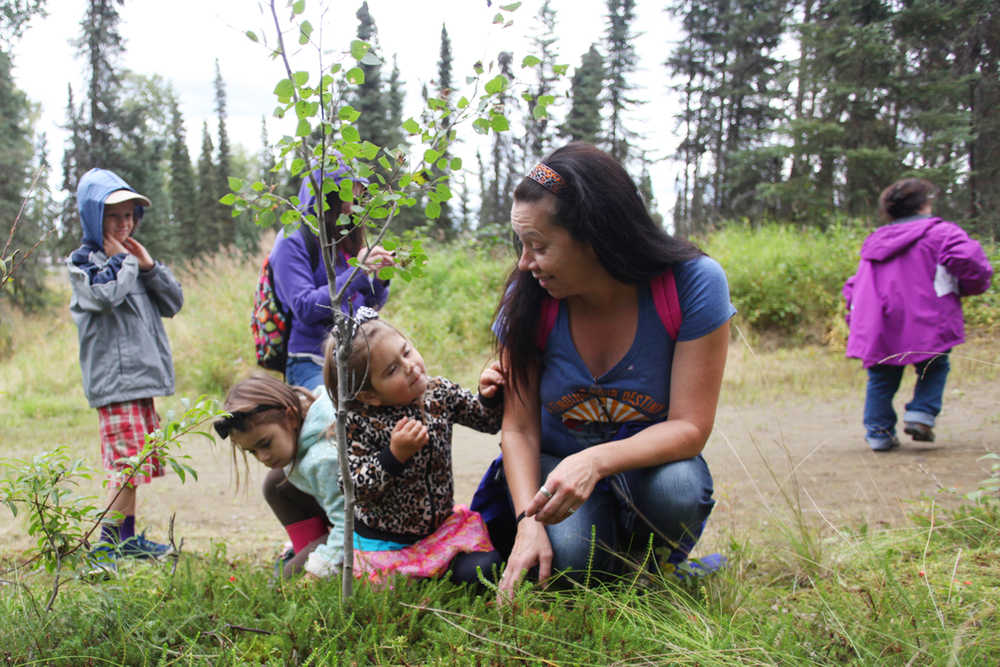This year’s Harvest Moon Festival was all about local foods — as local as they get.
From bright, bulging berries to papery, soaking wet seaweed, a host of Kenai Peninsula and national experts weighed in on wild edibles and seasonal harvests during the fourth annual event hosted by the Kenai Local Food Connection Aug. 12-18. This year’s long list of lectures, walks and activities aligned to teach attendees about the truest ways to live and eat sustainably.
“Any age is good to be introduced to wild foods,” said Janice Chumley, Integrated Pest Management Technician for the Kenai branch of the University of Alaska Fairbanks Cooperative Extension Service.
Chumley led Monday’s walk in the woods that started out at the food bank, where she and the extension service’s Health, Home, and Family Development Agent, Linda Tannehill, went over the basics of berry picking, cleaning and keeping.
Tannehill touted the high nutritional value of choosing naturally growing foods over their cultivated counterparts.
Southcentral Alaska is home to many species of wild fruits, including blueberries, cranberries, rose hips and raspberries, to name only a few. Some are safe to eat and some are not; some are easy to track down, others take a keen eye and knowledge of where things are most likely to crop up.
Chumley started with the example of the bane berry, which looks inviting enough to the hungry forager. The body is bright red or white in color with a single black spot on the outward facing surface of the berry, and protrudes in a cluster far above the large bush it stems from.
“It’s poisonous — it’s highly poisonous,” Chumley said. “It’s not something to mess with.”
Chumley asked that no one consume anything he or she does not feel 100 percent confident in indentifying. She also pointed out the likelihood that most foragers will be on their own when setting out to find their feast.
“I am here to tell you if you are here today thinking you are going to my favorite berry patch to pick 5 pounds, you are mistaken,” Chumley said.
While some may be hesitant to share their favorite patch, many, like Chumley, are more than willing to hand off what knowledge they have of the benefits of nature’s bounty.
Priscilla Russell spent decades adding to the collective work published in “Plantlore Wisdom from the Dena’ina People,” a compilation of wisdom from Dena’ina elders on the many uses of local flora.
“What we call ‘wilderness,’ that was their shopping center,” Russell said.
The Homer-based author first became interested in wild plants in the 1970s, when she arrived in Alaska with the sole intent of studying the dialects of the Dena’ina people. Many she met were willing to offer much more wisdom on living a subsistence lifestyle than she originally set out to find.
One of her favorite stories was of an elder she met named Shem Pete, Russell said. He told her about a day he cut his finger while out fishing, and it became so infected he went to a doctor for help. The practitioner told him the digit would have to be amputated but Shem Pete refused and went home.
After soaking the injury in wormwood and angelica for nearly a week, the infection healed and the finger was saved, Russell said. In her own experience, she has used the raw root of parsnip to alleviate the symptoms of a sore throat and nettles to combat hives induced by prolonged use of ibuprofen.
Beyond tracking down quick remedies, maybe the most important lessen one can glean from the Dena’ina elders is how they took care of the land and harvested sustainably, Russell said.
Sustainability and respect were also messages brought home by of the week’s Keynote Speaker Melinda Hemmelgarn, an award-winning dietician, writer, speaker and nationally syndicated radio host of Food Sleuth.
During her opening Friday night presentation, Hemmelgarn went over the whole of the nation’s food system, and the negative effects of GMOs, pesticide use and monoculture farming on the public’s overall health.
“We take for granted the core of our wellness,” she said, adding later, “…If you have prepared food you are involved in health care.”
Good food can be even more healing than Western medicine, Hemmelgarn argued. The human body absorbs so much of what it comes into contact with, and even small doses of harmful chemicals can be poisonous, she said.
While food isn’t the only factor, Hemmelgarn pointed out a direct correlation between cheaper foods and the average cost of medical bills. She said a healthy diet might mean paying more money up front on average, but in the long-term is a far more affordable option.
Additionally, farming only one crop, which is often genetically modified with the intent to fight of the adverse effects of pesticides, leaves a huge chunk of the nation’s food supply at risk, Russell said. Those fields are incredibly susceptible to being entirely wiped out by a single disease, she said.
“If you are not outraged, then you are not paying enough attention,” Hemmelgarn said.
However, she said, there is much hope and much to look forward to.
Throughout the evening Hemmelgarn gave pointers on what people can do immediately to eat well. Check labels on prepared foods, consume what is in season and products that are grown in a healthy, ethical way, she said.
“People are wanting a more honest relationship with their food,” Hemmelgarn said. “I think that is why farmers markets are becoming so popular.”
Reach Kelly Sullivan at kelly.sullivan@peninsulaclarion.com.

